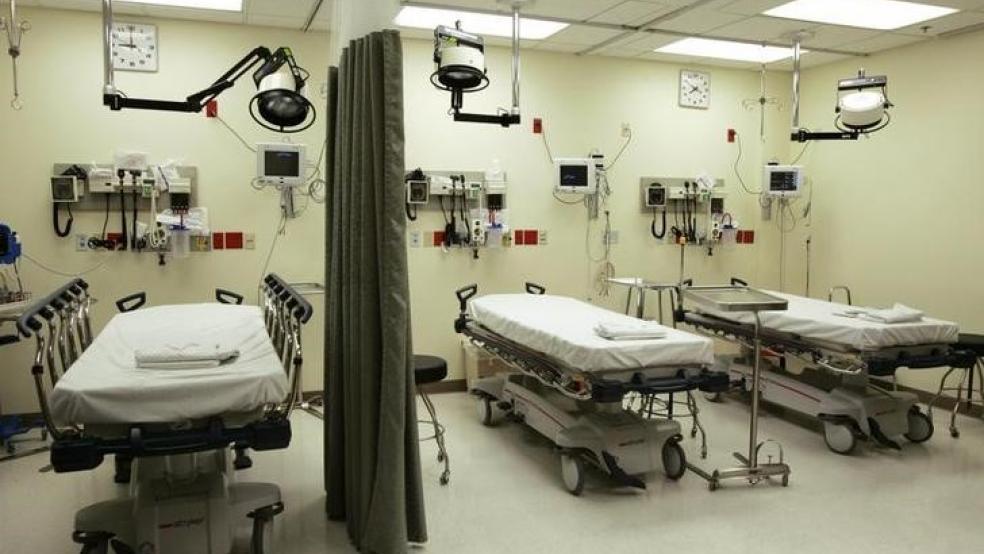The U.S. hospital industry is irate about provisions in the Republican plan to repeal and replace Obamacare that would freeze spending on expanded Medicaid coverage for 10 million people in 31 states in 2020 followed by sharply reduce federal assistance to Medicaid.
Joining forces with physicians, nurses, some insurers and advocates for the elderly and poor, top executives of the American Hospital Association complained last week that GOP efforts to transform Medicaid from an entitlement program to a fixed per capita allocation system would shortchange vulnerable people while continuing to reimburse providers below the actual cost of their services.
Related: Republican Health Plan: Good for the Budget, Bad for the Poor and Elderly
Those concerns were more than confirmed on Monday with the release of the much-anticipated Congressional Budget Office analysis of the GOP’s American Health Care Act: There would be 24 million fewer Americans with health care coverage than there would be under the current Obamacare law between 2018 and 2026, and the bulk of those losses – fully two-thirds -- would be among Medicaid beneficiaries.
CBO estimates that several major provisions of the GOP plan adversely affecting Medicaid would decrease spending on the program by $880 billion over the coming decade. That reduction would be due mainly to lower enrollments throughout the period, culminating in 14 million fewer Medicaid enrollees by 2026.
Related: GOP’s Repeal of Obamacare Taxes Could Put Medicare Closer to Insolvency
Some of that decline would be among people who are currently eligible for Medicaid benefits while others would be people who subsequently were made eligible by states that decide to accept the expanded Medicaid coverage before the ax starts to fall on the program.
“Some decline in spending and enrollment would begin immediately, but most of the changes would begin in 2020, when the legislation would terminate the enhanced federal matching rate for new enrollees under the ACA’s expansion of Medicaid and would place a per capita-based cap on the federal government’s payments to states for medical assistance provided through Medicaid,” CBO reported.
Federal spending on Medicaid has increased more than on Medicare over the past few years—to an average rate of 7.5 percent annually. That means Medicaid costs this year would be about $638 billion. But by 2026, Medicaid spending would be about 25 percent less than what CBO projects under current law.
As spending on Medicaid plummets, hospitals and other medical providers will incur steep losses to provide emergency treatment and services to those least able to pay for them.
Related: Ryan--We Don’t Know How Many We Will Cover or How Much It Will Cost
Under Obamacare, states that chose to participate in Medicaid expansion, which opened the program to single, able-bodied adults, broadened their programs to cover people making up to 138 percent of poverty-level income. States could decide whether to participate in accordance with a landmark June 2012 Supreme Court ruling.
If the Republican replacement plan is ultimately enacted, the states would continue to receive expanded Medicaid benefits until 2020. After that, the federal government would pay 90 percent of the cost of existing eligible beneficiaries while new beneficiaries would be funded at a much lower level. Eventually, the expanded program would be phased out.
Prior to the ACA, hospitals throughout the country struggled to cover the cost of charitable treatment of low-income patients, bad debts or inadequate reimbursement from Medicaid because of regional disparities in health care costs. Medicaid payments to hospitals and other providers amounted to 90 percent of the costs of patient care in 2013, according to estimates by the American Hospital Association.
Related: Medicare Could Save Nearly $16 Billion a Year Negotiating Drug Prices
Many studies – including one by researchers at Northwestern University -- have shown that reductions in uncompensated care costs almost exclusively occurred in states that expanded Medicaid, according to the Healthcare Financial Management Association.
“The uninsured has gone from 18 percent to 11 percent of the population. It's been very beneficial, particularly to my [hospital] members who are in lower-income neighborhoods and lower-income parts of this country and rural hospitals, too,” Thomas Nickels, executive vice president of the American Hospital Association, told National Public Radio on Monday. “So it will be a burden on the hospitals to have to have additional uncompensated care.”
Unfunded care in Medicaid expansion states fell from 4.1 percentage points of operating costs to 3.2 percentage points, said a report by the Healthcare Financial Management Association last August. “In non-expansion states, uncompensated care costs continued close to their existing trend, remaining at about 5.7 percentage points of hospitals’ operating costs,” the report stated.
Related: The GOP Health Plan: A Giant Step in the Wrong Direction or Merely Step One?
The Healthcare Financial Management Association, Robert Wood Johnson Foundation, Department of Health and Human Services, and Kaiser Family Foundation all found dramatic reductions in unfunded care resulting from both the ACA’s cost-saving mandates and Medicaid expansion.
The reports generally defined uncompensated care costs as the sum of losses on charity care and bad debt. Nickels warned that hospitals throughout the country would suffer a serious financial setback if the Republican Congress succeeds in rolling back expanded Medicaid.
“We would definitely want to continue that Medicaid expansion into the future.”





